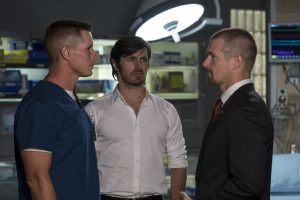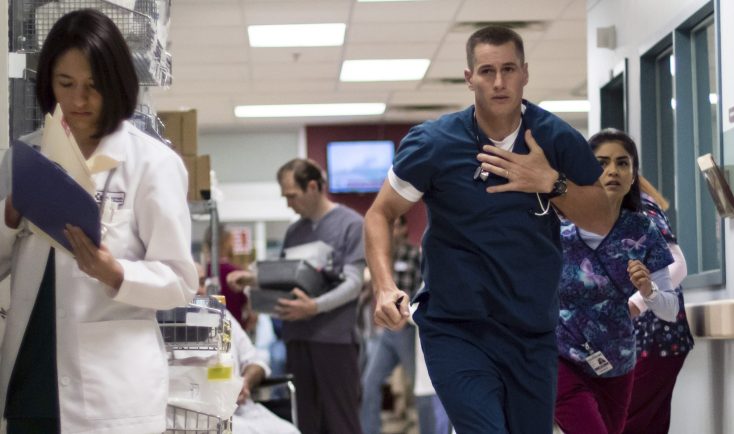
(l-r) Brendan Fehr as Drew Allister, Eoin Macken as TC Callahan, Josh Kelly as Xavier Arnold in THE NIGHT SHIFT. ©NBCUniversal Media. CR: John Britt/NBC.
By ANGELA DAWSON
Front Row Features
HOLLYWOOD—What distinguishes NBC’s “The Night Shift” from other current medical dramas is its frequent storylines about military vets and the particular crises they face upon their return to civilian life. In Thursday’s episode of the show, titled “Keep the Faith,” Josh Kelly guest stars as Xavier Arnold, a decorated combat veteran and rising political star. Xavier also has a secret that Dr. Drew Alister, played by series regular Brendan Fehr, knows and the story flashes back to the time when they were serving together in Iraq.
Fehr and Kelly, a former Army Ranger in real life who appeared in “Transformers: Revenge of the Fallen” and played Cutter Wentworth on “One Life to Live,” spoke at the Television Critics Association press tour about the episode and the show, which is based on the lives of dedicated, hardworking ER physicians at a fictional San Antonio hospital. The series continues to draw more viewers in its fourth season.
Q: Tell us about this season.
Fehr: This season is a bit different from past seasons. In a way, it feels like two different shows. Eoin (Macken’s) character, TC, spends the first five episodes in Syria. The military component of our show has always been an important one. We’ve explored it and we continue to explore it. It allows us to do so many more things than just sitting in a ER or a trauma room doing surgery. We get to tell so many different stories within the realm of the medical profession. Obviously, he’s over there taking care of people and saving them so it allows us to do a lot of things. This season we got to explore that even more with him being over there. That’s been a lot of fun and it’s kind of shaken up the show a little bit. It keeps it fresh. And you have a lot of us back at SAM dealing with that departure in a way. Ken (Leung, whose character was killed off in an earlier episode this season) on the show, died, so there’s a lot of loss in a lot of ways. Having everybody trying to adjust to those things has given everybody in the show new life. A death can give a show new life in some ways.
The episode coming up on August 10, we really get to into Drew’s backstory, his time in Iraq. He flashes back to Josh (Kelly’s) character, who is a politician on the show who has gained fame through his military prowess, and the medals he won for his role in a particular battle. His supposed accomplishments. Drew knows the real story. It all happened on this one day in particular, which ended up being Drew’s worst day out on the battlefield, which turns into the best day for Josh’s character. And we deal with that.
All of our shows are vet-inspired but particularly this one because everyone we hired for this particular episode was either current or former military—from background artists to guest stars. Josh is a former ranger. The writer/director, Tim Busfield, had been in the Navy.
It was a lot of fun to pay tribute to that and bring all of those people on board and hear their stories and have them be a part of something that we thought was special in our small way.
Kelly: It’s not small. As an actor who is a veteran, the military will always be a big part of my life. I care because I know veterans care about shows. It’s such a sensitive issue because it could just be Army stuff but (“The Night Shift”) do a lot of work to make sure it is correct. This episode, which is the only episode I’ve been in, I saw how hard they worked on making things right. The dialogue is very carefully looked at and it’s right, it’s Army. I was really impressed.
Q: Is the issue of stolen valor resolved in one episode?
Kelly: It’s utilized. My character pretends he went through Ranger school. I actually went through Rangers school. It’s one of the ways (“The Night Shift”) handles these situations. They realize he’s a terrible person for doing this and he can’t do it anymore but he’s still a person doing good. They handle things very truthfully.
Fehr: We try to give everyone shades of grey. You don’t want characters that are just bad for bad’s sake or good for good’s sake.
Kelly: Monsters have to eat too.
Fehr: In this particular episode Drew would like to hang him up and pin him to the wall. But he realizes, through other characters, that we can use this. We can use this to help people. You can get your closure on it in a way you need to. We get to play around with that. We raise these issues and then give different perspectives on them. We don’t necessarily solve them and wrap them up in a bow but we leave them open. You watch it and can you yourself in someone else’s shoes. We’re not out there to change minds but to open them.
Kelly: You do try to make my character feel bad, though.
Fehr: Yeah, as you should.
Q: Will your character return in a future episode?
Kelly: I don’t have a job right now so…
Q: How important was it for you for this episode to get it right?
Kelly: It’s very important. I’ve done short films directed by former Rangers. I made a short film during the writers’ strike and PTSD and suicide. I used to make fun of my dad—he’s a veteran as well—he’s a Navy guy. He’d always get made when movies weren’t right. I was like, “Dad, it’s a movie. It doesn’t matter.” After I was in the military, I found out it does matter. It’s important to get it right. It’s important to treat the truth of the characters well. It’s kind of scary. I think that’s why I tried to avoid playing soldiers for a long time because I felt you can mess up something else but you can’t mess up being a soldier. For one thing, your buddies will call you on it but it’s also important because of the heritage.
Q: Are there translatable skills from being an Army Ranger to being an actor?
Kelly: I always wanted to be an actor. I joined the military so I could (later) do action movies. I did theater growing up. My parents told me I couldn’t audition for professional roles until after high school. I (enlisted) before the war. I didn’t know we were going to go to war. I was fortunate enough to be in the best unit in the military. I went to war before they set up NWR tents. I spent two months living in holes and stuff looking for Bin Laden. This one guy set up a projector and we got to watch “A Night at the Roxbury,” and it was the best two hours of our lives. It made me realize the importance of entertainment. I was always the skit guy, entertaining everyone. It gets you through. “A Night at the Roxbury” was the most valuable movie we saw because we’d been literally living in holes and not showering, and it just made me feel good.
Entertainment seems to have such an intangible value. What we do, especially shows like (“The Night Shift”), where they care about (authenticity) and the veterans, entertainment IS important for soldiers. It gets you through. I’m fortunate enough that I get to do what I believe in now and I get to say it because I also was on the other side.
Fehr: Like Winston Churchill said, “If we’re not fighting for the arts, then what are we fighting for?” We’re out there in Albuquerque (N.M.) playing make believe and having fun. My wife volunteers, working with Syrian refugees adapt and transition to American life, and you wonder if what you’re doing is valuable. Then you hear stories, like Josh’s and “Night at the Roxbury,” and you understand that entertainment can be valuable and there’s something to be said for what we do and why we’re doing it.
After my character came out of the closet, there were so many people that have reached out to me and said, “Thank you. I really appreciate that character.” And (others who didn’t like the fact he was gay) said, “Well, your character’s cool, though,” so we may be a little part of opening up someone’s mind to a different perspective or maybe helping someone who feels lost. In one respect, it’s make believe and fun and we understand we’re blessed to be (acting). It’s silly in on respect but it’s also powerful. You’ve got to keep both those things in mind: You can’t take yourself too seriously or get crazy and overblow it. What you do is going to affect someone in some way. We’re telling stories so we can connect with people. The smallest thing can change a life or open up a mind, and I think that’s pretty important.
“The Night Shift” airs Thursdays on NBC at 10 p.m./9C.





